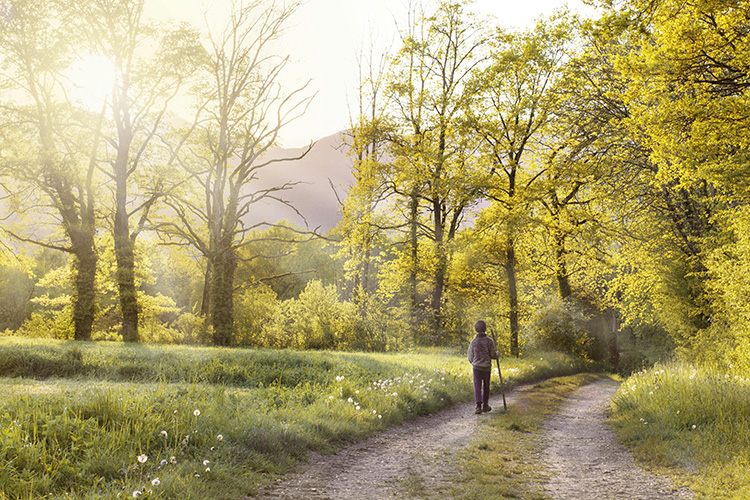
Benefits of cold showers, barefoot walking and getting back to nature
Taking the plunge with cold showers
The mere thought of a cold shower can elicit shivers, but don't let the initial shock deter you! Embracing a daily cold rinse is a practice championed by many, from athletes to ancient philosophers, and for very good reason. It's a powerful jolt that impacts both physical and mental wellbeing, with a wealth of benefits that far outweigh a few moments of initial discomfort. Let's take a look at the benefits.Boosts circulation: Cold water causes blood vessels to constrict and then rapidly dilate when the water warms. This vascular exercise improves blood flow, delivering oxygen and nutrients more efficiently throughout the body.
Enhances immunity: Studies suggest that regular cold exposure can increase the number of white blood cells (leukocytes), which are our body's disease-fighting cells, making us more resilient to illness. In a study published online by the National Library of Medicine, it was found that "swimming in cold water induced a significant variation in the blood cell fraction composition compared to the rest condition, as measured the day before the competition. Red blood cells, white blood cells and platelets count increased significantly".
Reduces inflammation: Cold therapy is well-known for reducing swelling and muscle soreness after physical activity, aiding faster recovery.
Improves skin and hair health: Cold water helps to tighten pores and cuticles, locking in moisture and giving our skin and hair a healthier, more vibrant appearance.
Increases alertness & energy: The cold can stimulate the release of endorphins, often called "feel-good hormones", which can alleviate symptoms of depression and anxiety, leaving us with a sense of euphoria and calm afterwards.
Builds willpower & resilience: Consistently stepping into the cold builds mental strength. It teaches us to stay calm under stress and push past discomfort.
If you have any concerns about your suitability for cold water exposure, it is best to discuss this with your GP beforehand. It is also important to pace yourself appropriately - don't jump straight into an ice bath. Begin by ending a regular warm shower with 30 seconds of cold water, gradually increasing the duration and decreasing the temperature over time. Focus on deep breathing to manage the initial chill.
The power of barefoot walking
When was the last time you felt the earth beneath your feet? In a world of concrete and comfortable shoes, many of us have lost this fundamental connection. Barefoot walking, or "earthing" (sometimes called "grounding"), is the practice of direct skin contact with the surface of the earth. It's a powerful way to tap into the earth's natural electrical charge, which can have profound effects on our bodies.The earth's surface carries a subtle electrical charge, and when we connect with it, our bodies can absorb these free electrons. Modern lifestyles often insulate us from this beneficial energy, potentially leading to chronic inflammation and other health issues.
The benefits of going shoeless
Reduces inflammation: The free electrons from the earth act as antioxidants in the body, neutralising free radicals and significantly reducing chronic inflammation, which is at the root of many diseases.Improves sleep quality: Earthing can help resynchronise our bodies' natural circadian rhythms, leading to deeper, more restorative sleep.
Decreases chronic pain: By reducing inflammation, many people report a significant reduction in various types of chronic pain.
Boosts mood and reduces stress: Connecting with the earth can calm our nervous system, lower cortisol levels and promote feelings of tranquillity and wellbeing.
Increases energy levels: Many people report feeling more energised and less fatigued after regular grounding practices.
The best surfaces for earthing are natural conductive materials like grass, sand, soil and even concrete (but not asphalt, wood or vinyl). A grassy park or sandy beach are perfect starting points.
Embracing nature
The simple act of spending time in nature offers a holistic balm for the modern soul. Our innate connection to the natural world, often referred to as "biophilia", means we are wired to thrive when we are surrounded by greenery, fresh air and natural sounds. From the towering trees of a forest to the gentle lapping of waves on a shore, nature has the ability to restore, rejuvenate and inspire. It's a natural antidote to the stresses of urban living and digital overload.The advantages of being in nature
Reduces stress & anxiety: Spending time in nature has been shown to lower levels of the stress hormone cortisol, reduce blood pressure and decrease heart rate.Improves mood & cognitive function: Exposure to nature can boost feelings of happiness and wellbeing, while also improving memory, concentration and problem-solving abilities.
Boosts creativity: A change of scenery, especially one involving natural elements, can spark new ideas and enhance innovative thinking.
Enhances physical activity: Nature naturally encourages movement, whether it's hiking, cycling, gardening or simply a leisurely walk, contributing to better physical health.
Strengthens your immune system: Research into "forest bathing" (shinrin-yoku) suggests that inhaling natural compounds called phytoncides, emitted by trees, can increase the activity of natural killer (NK) cells, which fight infections and cancer.
You don't need to embark on a wilderness expedition to reap the benefits of nature. Start by taking a mindful walk in a local park, tending to a small garden or simply sitting on a bench and observing the trees, birds and sky. Even bringing plants into our homes can offer a touch of green therapy.